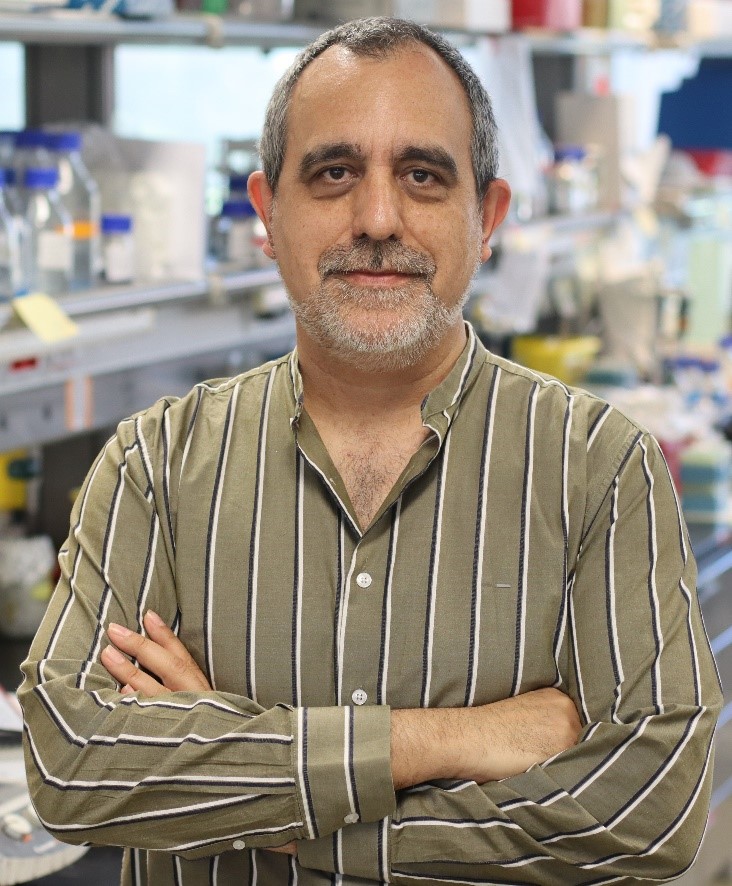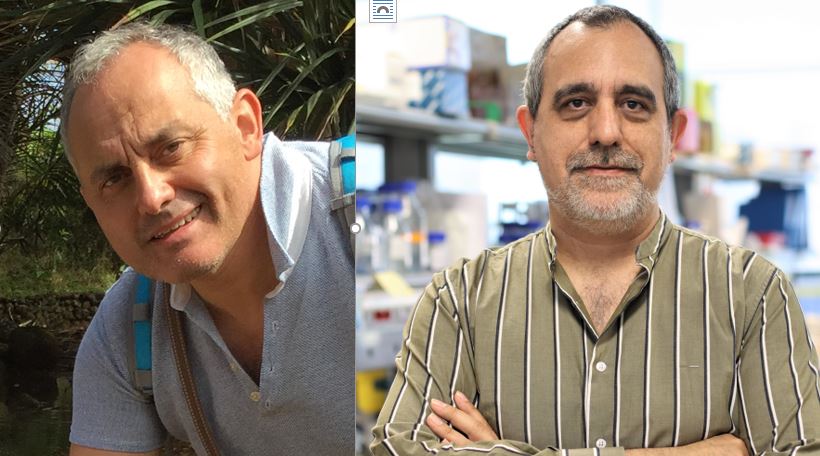José Antonio Enríquez and Miguel Ángel del Pozo, new members of EMBO
Dr Enríquez and Dr del Pozo Muñoz join their colleagues Dr Miguel Torres, Dr Pura Muñoz and Dr Francisco Sánchez Madrid, bringing to five the number of CNIC members in EMBO
The researchers of the Spanish National Centre for Cardiovascular Research (CNIC) JJosé Antonio Enríquez and Miguel Ángel del Pozo have been named members of the (European Molecular Biology Organization (EMBO). Today, EMBO announced the names of the 64 scientists accepted into the organization, whose members are over 1,800 of the finest researchers in Europe and the world; new members are nominated and voted for by current members. Dr Enríquez and Dr del Pozo join their colleagues Dr Miguel Torres, Dr Pura Muñoz and Dr Francisco Sánchez Madrid, bringing to five the number of CNIC researchers who are EMBO members.
"I am delighted to be able to welcome the new members to our organization and I hope to have the opportunity to work with them", said Maria Leptin, Director of EMBO. "Membership of EMBO acknowledges the outstanding achievements in life sciences of the selected scientists. The new members will bring their experience to further strengthen EMBO and its initiatives".
EMBO members actively participate in the organization: They sit on the EMBO board, the various committees and the advisory editorial board of EMBO journals. They also evaluate the applications of EMBO calls for funding and act as mentors for scientists who are just setting out on their professional careers. The new members will be formally inducted at the annual meeting of EMBO members between 27 and 29 October 2021.

José Antonio Enríquez graduated in biochemistry and molecular biology from the Universidad Autónoma of Madrid in 1986 and received his PhD from the University of Zaragoza (UniZar) in 1992. For his thesis, he studied various aspects of the biogenesis of mitochondrial DNA (mtDNA). Between 1993 and 1997, he moved to the laboratory of Dr. Giuseppe Attardi en el California Institute of Technology de Pasadena (USA), where he researched the pathogenic action of mitochondrial tRNA mutations. His work during this period contributed to defining the molecular mechanism underlying this phenomenon and helped establish a general method for the study of mitochondrial tRNA. This method has been applied in mitochondrial biogenesis studies and in the analysis of diseases related with mtDNA. In 1997, Dr Enríquez returned to found his research group at UniZar, where he became full professor in 1999 and achieved the Chair in Biochemistry and Molecular and Cellular biology in 2007. Between September 2007 and May 2008, he undertook a sabbatical in the MRC- Mitochondrial Biology Unit Cambridge, United Kingdom, at the invitation of the Unit's Director, Dr Sir John Walker. He joined the CNIC as a Senior Researcher in 2009. Between September 2014 and August 2015, he undertook a second sabbatical at the University of Boston (USA) at Dr Orian Shirihai's laboratory.
Dr Enríquez has generated 146 publications, been cited 10,269 times and made major contributions to the understanding of biogenesis and mitochondrial bioenergetics, its role in cellular apoptosis
Dr Enríquez has generated 146 publications, been cited 10,269 times and made major contributions to the understanding of biogenesis and mitochondrial bioenergetics, its role in cellular apoptosis, the structure and regulation of the electron transport chain, the pathological consequences of abnormalities in mitochondrial function and the relevance of the genetic variability of mtDNA among mammal populations in the metabolism, longevity and susceptibility to disease, with particular emphasis on cardiovascular diseases.

Miguel Ángel del Pozo holds a degree in Medicine (University of Valladolid, 1991) and is a specialist in Immunology (Hospital de la Princesa, Madrid 1995). The subject of his 1997 PhD thesis (Biochemistry Department UAM) was the function of adhesion receptors (ICAMs and leukocyte integrins) and chemokines in cell polarization and leukocyte migration during inflammation. During his post-doctoral research at the laboratory of Prof. Martin Schwartz at the Scripps Research Institute, La Jolla, California (USA), he contributed to elucidation of the role of the Rho family GTPases in the regulation of intracellular signals by integrins, growth factors and mechanical stimuli.
In 2002, he set up his independent research group as assistant professor at Scripps, focusing on the intracellular signalling of integrins (the main receptors of the extracellular matrix - ECM), lipid microdomains rich in cholesterol and caveolae (nano-invaginations of the plasma membrane - PM). In 2004, the CNIC recruited him as Junior Head of Research Group, and he achieved promotion to Senior Head of Research Group (Associate Professor) in 2006, becoming Full Professor in 2010.
His research group aims to understand the molecular mechanisms by means of which cells and tissues physically and biochemically interact with their micro-environment, and the impact of this on health and disease. He has contributed basic knowledge in the area of compartmentalization of signalling by the Rho family GTPases through remodelling of the PM and the actin cytoskeleton, and their interdependence with caveolar components in mechanotransduction, membrane trafficking, cell migration and cell growth, and reciprocal cell-ECM communication. With his group, he also showed that caveolin regulates mechanical remodelling and ECM deposition through exosomes, the dynamics of the PM in immune system cells, epithelial-mesenchymal transition and the role of YAP in mechanotransduction, contributing to metastasis, fibrosis and cardiovascular diseases.
His research group aims to understand the molecular mechanisms by means of which cells and tissues physically and biochemically interact with their micro-environment, and the impact of this on health and disease
These discoveries have earned him awards such as the EURYI (European Young Investigator Award) in 2004, selection by EMBO as "young investigator" (EMBO YIP) in 2005, and the Carmen y Severo Ochoa Award (2012). To date, he has contributed 101 publications that have obtained 9,199 citations (an h-index of 51, WoS).
He has pioneered communication between physicists, biologists and clinicians in the emerging field of mechanobiology, participating in international consortia and organising conferences such as the "CNIC Mechanobiology conference" in 2016, and the first conference in the world on caveolae (EMBO Workshop 2019). He is currently the coordinator of the La Caixa Foundation funded international consortium, "AtheroConvergence", whose members are the universities of Yale (USA), Aarhus (Denmark), CICbiomaGUNE (San Sebastian, Spain) and the CNIC, that aims to explore key aspects in the physiology of atherosclerosis. At CNIC, he has been Head of the Vascular Biology and Inflammation Department (2007-2010) and Coordinator of the Development and Cellular Biology Area (2014-2020).
"I feel gratified, honoured and proud to have been selected as a member of EMBO, privileged to have become a member with my first nomination, and grateful to those who proposed, supported and voted for me, and to all the members of my laboratory team and collaborators; the merit is shared by all of us", said Miguel Ángel.











